Related Research Articles

The Royal Ulster Constabulary (RUC) was the police force in Northern Ireland from 1922 to 2001. It was founded on 1 June 1922 as a successor to the Royal Irish Constabulary (RIC) following the partition of Ireland. At its peak the force had around 8,500 officers, with a further 4,500 who were members of the RUC Reserve.

Castlereagh was a local government district with the status of borough in Northern Ireland. It merged with Lisburn City Council in May 2015 under local government reorganisation in Northern Ireland to become Lisburn and Castlereagh City Council, with a small amount being transferred to Belfast City Council.
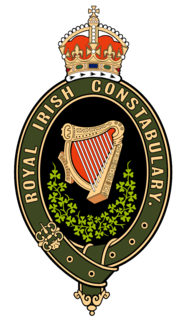
The Royal Irish Constabulary was the police force in Ireland from 1822 until 1922, when all of the country was part of the United Kingdom. A separate civic police force, the unarmed Dublin Metropolitan Police (DMP), patrolled the capital and parts of County Wicklow, while the cities of Derry and Belfast, originally with their own police forces, later had special divisions within the RIC. For most of its history, the ethnic and religious makeup of the RIC broadly matched that of the Irish population, although Anglo-Irish Protestants were over-represented among its senior officers.

William David Trimble, Baron Trimble, was a British politician who was the first First Minister of Northern Ireland from 1998 to 2002, and leader of the Ulster Unionist Party (UUP) from 1995 to 2005. He was also Member of Parliament (MP) for Upper Bann from 1990 to 2005 and Member of the Legislative Assembly (MLA) for Upper Bann from 1998 to 2007.
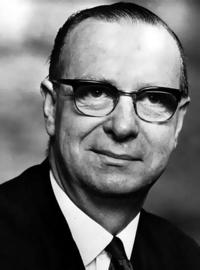
Gerard Fitt, Baron Fitt was a politician in Northern Ireland. He was a founder and the first leader of the Social Democratic and Labour Party (SDLP), a social democratic and Irish nationalist party.

Sir Jeffrey Mark Donaldson is a Northern Irish politician who has served as leader of the Democratic Unionist Party (DUP) since June 2021. He has been the Member of Parliament (MP) for Lagan Valley since 1997, and leader of the DUP in the UK House of Commons since 2019. As of 2022, he is Northern Ireland's longest-serving MP.

James Henry Molyneaux, Baron Molyneaux of Killead, KBE, PC was a Northern Irish unionist politician, and leader of the Ulster Unionist Party (UUP) from 1979 to 1995. An Orangeman, he was also Sovereign Grand Master of the Royal Black Institution from 1971 to 1995, and a leading member of the Conservative Monday Club.

The Ulster Special Constabulary was a quasi-military reserve special constable police force in what would later become Northern Ireland. It was set up in October 1920, shortly before the partition of Ireland. It was an armed corps, organised partially on military lines and called out in times of emergency, such as war or insurgency. It performed this role most notably in the early 1920s during the Irish War of Independence and the 1956-1962 IRA Border Campaign.
The Ulster Defence Regiment (UDR) was an infantry regiment of the British Army established in 1970, with a comparatively short existence ending in 1992. Raised through public appeal, newspaper and television advertisements, their official role was the "defence of life or property in Northern Ireland against armed attack or sabotage" but unlike troops from Great Britain they were never used for "crowd control or riot duties in cities". At the time the UDR was the largest infantry regiment in the British Army, formed with seven battalions plus another four added within two years.
Events in the year 1969 in Ireland.

The Remembrance Day bombing took place on 8 November 1987 in Enniskillen, County Fermanagh, Northern Ireland. A Provisional Irish Republican Army (IRA) bomb exploded near the town's war memorial (cenotaph) during a Remembrance Sunday ceremony, which was being held to commemorate British military war dead. Eleven people were killed, many of them elderly, and 63 were injured.

British Army corporals Derek Wood and David Howes were killed by the Provisional IRA on 19 March 1988 in Belfast, Northern Ireland, in what became known as the corporals killings. The soldiers drove into the funeral procession of an IRA member. Three days before, loyalist Michael Stone had attacked an IRA funeral and killed three people. Believing the soldiers were loyalists intent on repeating Stone's attack, dozens of people surrounded and attacked their car. During this, Corporal Wood drew his service pistol and fired a shot into the air. The soldiers were then dragged from the car and taken to a nearby sports ground where they were beaten, stripped and searched. They were then driven to a nearby waste ground where they were shot dead.

Ulster Resistance (UR), or the Ulster Resistance Movement (URM), is an Ulster loyalist paramilitary movement established by the Democratic Unionist Party (DUP) in Northern Ireland in November 1986 in opposition to the Anglo-Irish Agreement.

Operation Banner was the operational name for the British Armed Forces' operation in Northern Ireland from 1969 to 2007, as part of the Troubles. It was the longest continuous deployment in British military history. The British Army was initially deployed, at the request of the unionist government of Northern Ireland, in response to the August 1969 riots. Its role was to support the Royal Ulster Constabulary (RUC) and to assert the authority of the British government in Northern Ireland. This involved counter-insurgency and supporting the police in carrying out internal security duties such as guarding key points, mounting checkpoints and patrols, carrying out raids and searches, riot control and bomb disposal. More than 300,000 soldiers served in Operation Banner. At the peak of the operation in the 1970s, about 21,000 British troops were deployed, most of them from Great Britain. As part of the operation, a new locally-recruited regiment was also formed: the Ulster Defence Regiment (UDR).
The Hunt Report, or the Report of the Advisory Committee on Police in Northern Ireland, was produced by a committee headed by Baron Hunt in 1969. An investigation was performed into the perceived bias in policing in Northern Ireland against Catholics and other unprofessional practices. The Hunt Report was published on 10th October 1969 and proposed removing the military function from the Royal Ulster Constabulary, the disbandment of the Ulster Special Constabulary(widely referred to as the B Specials), and their replacement of their military function to a new locally-recruited part time force, which became the Ulster Defense Regiment. Most of the main proposals of the Hunt Report were implemented, and the B-Specials were disbanded in March 1970. The reaction from some in the Unionist community was aggressive. Constable Victor Arbuckle was shot when the RUC attempted to disperse a crowd of Unionists that had gathered near the Catholic area of Unity Flats. Critics would later state that the UDR displayed problems of bias and a difficulty with maintaining a balance of Catholic/Protestant membership, similar to its forerunners.
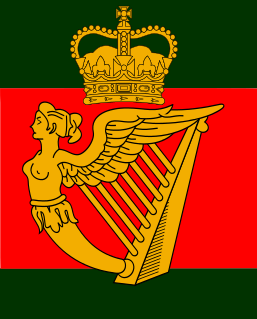
1st Battalion, Ulster Defence Regiment was formed in 1970 as part of the 7 original battalions specified in The Ulster Defence Regiment Act 1969, which received Royal Assent on 18 December 1969 and was brought into force on 1 January 1970. It was amalgamated with the 9th Battalion, Ulster Defence Regiment in 1984 to form the 1st/9th Battalion, Ulster Defence Regiment.

2nd Battalion, Ulster Defence Regiment was formed in 1970 as part of the seven original battalions specified in the Ulster Defence Regiment Act 1969, which received Royal Assent on 18 December 1969 and was brought into force on 1 January 1970. It was, along with the rest of the regiment, amalgamated with the Royal Irish Rangers in 1992 to form the Royal Irish Regiment. It had previously been amalgamated in 1991 with the 11th Battalion Ulster Defence Regiment to form the 2nd/11th Battalion Ulster Defence Regiment.
Colin Duffy is an Irish republican, described by the BBC as the most recognisable name and face among dissident republicans in Northern Ireland. He was cleared of murder charges in three court cases involving police and army killings.
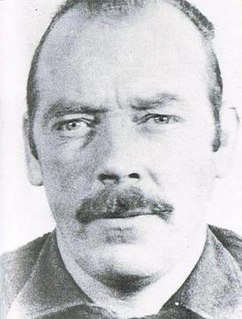
William Henry Wilson Hanna MM was a high-ranking Ulster loyalist who founded and led the Mid-Ulster Brigade of the Ulster Volunteer Force (UVF) until he was killed, allegedly by Robin Jackson, who took over command of the brigade.
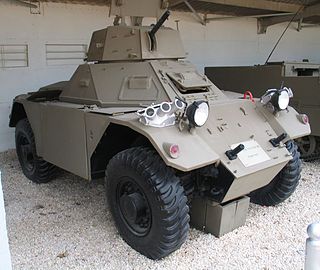
On 2 May 1974 the Provisional Irish Republican Army (IRA) attacked a British Army base manned by the Ulster Defence Regiment (UDR) near the Northern Ireland–Republic of Ireland border at Clogher, County Tyrone. The IRA unit engaged the small base with automatic weapons, rockets and improvised mortars. Ferret armoured cars were deployed to the scene and a fierce firefight erupted. The IRA withdrew behind the border with the Republic. The assault on the outpost killed greenfinch Eva Martin and wounded another UDR soldier.
References
- ↑ "St. Mary's Past Pupils". Edmund Rice Schools Trust. Retrieved 25 February 2022.
- ↑ "Chris Ryder : Journalist and author dies aged 73". BBC Northern Ireland. Retrieved 25 February 2022.
- ↑ "Chris Ryder obituary". The Times. Retrieved 25 February 2022.
- ↑ "A good old-fashioned hack". Esther Blueburger. Retrieved 25 February 2022.
- ↑ "NI Policing Board makes 'gross misuse of public money'". BBC Northern Ireland. Retrieved 25 February 2022.
- ↑ McDonald, Henry. "Chris Ryder obituary". The Guardian. Retrieved 25 February 2022.